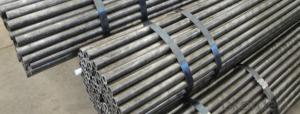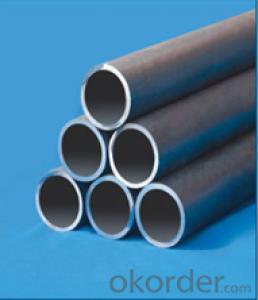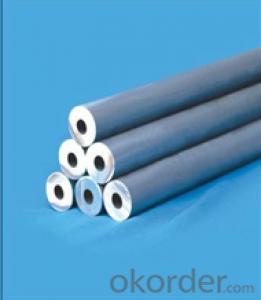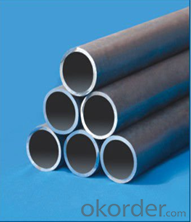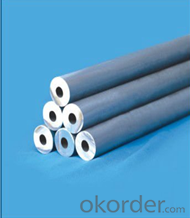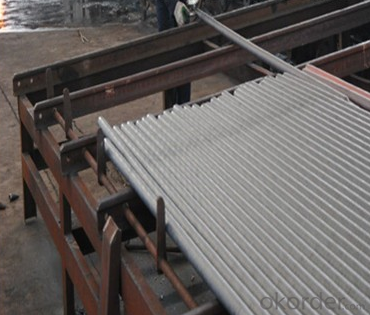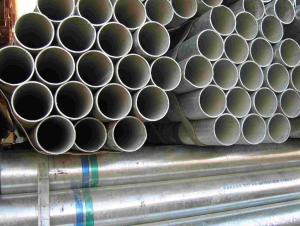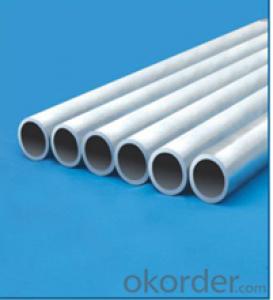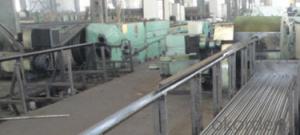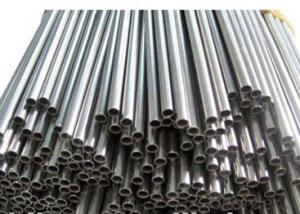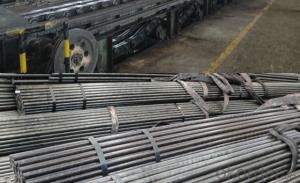Seamless HARD Carbon Steel Pipe&Tube For Tunnel And Anchor Rod 42CrCNBMMo
- Loading Port:
- Qingdao
- Payment Terms:
- TT OR LC
- Min Order Qty:
- 10 pc
- Supply Capability:
- 30 pc/month
OKorder Service Pledge
OKorder Financial Service
You Might Also Like
Quick Details
| Thickness: | 1 - 14 mm | Section Shape: | Round | Outer Diameter: | 8 - 80 mm |
| Place of Origin: | HEB,HEB,HEB,China,FORM A,FORM E China (Mainland) Ch China (Mainland) | Secondary Or Not: | Non-secondary | Application: | Hydraulic Pipe |
| Technique: | Cold Rolled | Certification: | ISO9001:2008 | Surface Treatment: | oil |
| Special Pipe: | Thick Wall Pipe | Alloy Or Not: | Is Alloy | length: | 5-8m |
| usage3: | machine bush parts | usage4: | machine and engine pin | usage5: | tunnel and anchor rod |
| Test: | eddy current test,Ultrasonic Testing | usage2: | shock absorption bush | usage1: | power transmission machinery |
| colour: | black | name: | large-diameter hot-expanding seamless steel pipe | Grade: | 10#,20#,45#,16Mn,16Mo,16mo3,Q345,ST35,St37,ST37.4,St52,10#-45#,Mo,Q195-Q345,ST35-ST52 |
| Standard: | ANSI A210-1996,ASTM A1020-2002,ASTM A213-2001,ASTM A403-2007,ASTM A789-2001,BS 1387,BS EN10296,DIN 17175,DIN EN 10025,DIN EN 10217-1-2005,GB/T8162,GB/T8163,JIS G3459-2004,JIS G3461-2005,ASTM,BS,DIN,GB,JIS |
Packaging & Delivery
| Packaging Detail: | Marking: as per customer's requests. Painting varnish coating on the pipe. steel trips, woven bag |
| Delivery Detail: | 10-45 days or as the customer's request |
Seamless Carbon Hard Steel Pipe&Tube For Tunnel And Anchor Rod
Type | Manufacture & Sales OEM | |
Process | Seamless, Cold drawn and Cold rolled, finish-rolled | |
Material | 20#, 10#, 45#, 35# , Q345, 16Mn, 42CrMo | |
size | Outer Diameter | 8 –80mm |
Wall Thickness | 1-14mm | |
Length | 5-10m | |
Standard
| DIN st42, st45, st35, st37 and st52, GB 8162 | |
Package | 1. Bundle packing. 2. Bevelled end or plain end or warnished as per buyer's requestments. 3. Marking: as per customer's requests. 4. Painting varnish coating on the pipe. 5. Plastic caps at ends. | |
Delivery Time | 15to20 days or as clients reqestments | |
- Q: How do you repair damaged steel pipes?
- To fix steel pipes that have been damaged, there are several steps you can take: First, you need to determine the extent of the damage. Assess how severe it is to decide if you can repair it or if you need to replace the entire pipe. Next, isolate and drain the section that is damaged. Shut off the water supply to that part of the pipe and drain any remaining water to prevent further leaks or damage. After that, clean the damaged area by removing any dirt, rust, or debris. You can use a wire brush or sandpaper for this job. Then, prepare the damaged area by roughening the surface with coarse sandpaper. This will help the repair material adhere better to the pipe. Next, choose a repair method based on the size and location of the damage. There are different options available such as using epoxy putty, pipe wraps, or clamps. Once you've chosen a repair method, follow the instructions provided to apply the repair material to the damaged area. Make sure it covers the entire damaged section and extends slightly beyond it for added protection. After applying the repair material, allow it to cure according to the manufacturer's instructions. This will ensure a strong bond and effective sealing of the damaged area. Once the repair has cured, turn the water supply back on and check for any leaks. If there are no signs of leakage, then the repair has been successful. If there are still leaks, you may need to reconsider the repair or seek professional help. Keep in mind that these steps are a general guideline for repairing damaged steel pipes. The specific repair method may vary depending on the size and severity of the damage. In more complex cases or if you're unsure, it's best to consult a professional plumber or pipe repair specialist.
- Q: What is the average lifespan of a steel pipe?
- The average lifespan of a steel pipe can vary depending on various factors such as the quality of the steel, the environment it is exposed to, and the maintenance practices followed. However, on average, a well-maintained steel pipe can last anywhere between 20 to 100 years.
- Q: What are the different end finishes for steel pipes?
- The different end finishes for steel pipes include plain ends, beveled ends, threaded ends, and grooved ends.
- Q: What is the difference between black and galvanized steel pipes?
- The main difference between black and galvanized steel pipes lies in their coating. Black steel pipes are untreated and have a dark, uncoated appearance, while galvanized steel pipes are coated with a layer of zinc to prevent corrosion. This zinc coating on galvanized pipes helps protect against rust and extends their lifespan, making them suitable for outdoor and exposed applications. Black steel pipes, on the other hand, are typically used for indoor applications and are often painted or coated after installation to prevent rusting.
- Q: Can steel pipes be used for signposts or street lighting poles?
- Yes, steel pipes can be used for signposts or street lighting poles. Steel pipes are often chosen for their durability, strength, and resistance to harsh weather conditions, making them suitable for supporting signs or street lighting fixtures.
- Q: Can steel pipes be used for natural gas processing plants?
- Yes, steel pipes can be used for natural gas processing plants. Steel pipes have excellent strength and durability, making them suitable for transporting and processing natural gas. They can withstand high-pressure conditions and are resistant to corrosion, providing a safe and reliable option for gas processing facilities.
- Q: What are the different types of steel pipe unions?
- Various industries and applications commonly utilize several types of steel pipe unions. Some of the most frequently used types are as follows: 1. Threaded Union: This union features female threads on both ends, facilitating easy attachment to two male threaded pipes. It ensures a reliable connection that is resistant to leaks. 2. Socket Weld Union: On one end, this union has a socket, while the other end is equipped with a female threaded connection. It is specifically designed for socket welding, where the pipe is inserted into the socket and then welded around the joint, resulting in a robust and long-lasting connection. 3. Butt Weld Union: This specific union is employed for joining two pipes with butt weld ends. It necessitates beveling the pipes and subsequently welding them together, creating a sturdy and permanent connection. 4. Compression Union: Typically used for connecting pipes made of softer materials like copper or plastic, compression unions consist of a compression nut and a compression ring. These components are tightened onto the pipe, ensuring a tight and secure seal. 5. Flanged Union: This union is equipped with flanges on both ends, allowing it to be bolted onto two flanged pipes. Flanged unions are commonly utilized in applications where easy disassembly and reassembly are necessary. 6. Grooved Union: Grooved unions possess grooves on their ends, which are utilized for connecting pipes by inserting them into the grooves and securing them with a coupling. They are often utilized in fire protection systems and other applications where quick installation and easy maintenance are of utmost importance. These examples represent only a fraction of the numerous types of steel pipe unions available. The selection of a union depends on the specific requirements of the application, such as the pipe material, size, and operating conditions. Seeking advice from a professional or consulting industry standards can aid in determining the most suitable union for a particular project.
- Q: How are steel pipes used in geothermal energy systems?
- Steel pipes are commonly used in geothermal energy systems to facilitate the transport of fluids, such as water or steam, between the geothermal source and the power plant. These pipes are designed to withstand high temperatures and pressures, ensuring the safe and efficient transfer of geothermal fluids. Additionally, steel pipes are used in the construction of geothermal wells, providing structural support and maintaining the integrity of the wellbore.
- Q: Water, gas, steel pipes, thick steel wire means?
- Often used in water, heating, gas, compressed air and vacuum lines. Can be used in pressure gauge pressure of 0.6 MPa (6 atm) steam pipe and condensate pipeline below, can also be used for conveying non erosive and non flammable and explosive media. Is divided into ordinary (working pressure is 1 MPa pressure gauge, 10) and strengthening (working pressure gauge is 1.6 MPa, 16 ATM) two. Galvanized white iron tube (galvanized iron tube). Non galvanized black iron pipe (black pipe).
- Q: What is the difference between steel pipe and polyethylene pipe?
- Steel pipe and polyethylene pipe are utilized for plumbing and construction purposes, but they differ in terms of their materials and characteristics. Steel pipe derives its strength and durability from a combination of iron and carbon. It is commonly employed in industrial settings or for underground gas and oil pipelines where high pressure and heavy loads are expected. Steel pipe is renowned for its corrosion resistance and ability to withstand extreme temperatures. In contrast, polyethylene pipe is a plastic pipe crafted from either high-density polyethylene (HDPE) or low-density polyethylene (LDPE). It is lightweight, flexible, and easy to install, making it a popular choice for residential plumbing and irrigation systems. Polyethylene pipe can resist chemicals, UV rays, and abrasive materials, making it suitable for both above-ground and underground installations. Another notable distinction between steel pipe and polyethylene pipe is their respective costs. Steel pipe is generally more expensive due to the raw materials and manufacturing processes involved. Conversely, polyethylene pipe is relatively affordable and cost-effective, especially for smaller-scale projects. Regarding maintenance, steel pipe necessitates periodic inspections and maintenance to prevent corrosion and ensure durability. Conversely, polyethylene pipe is virtually maintenance-free due to its resistance to corrosion and chemical degradation. To summarize, the primary differences between steel pipe and polyethylene pipe lie in their composition, strength, durability, cost, and maintenance requirements. The choice between these pipes depends on the project's specific needs, considering factors such as pressure, load, budget, and environmental conditions.
Send your message to us
Seamless HARD Carbon Steel Pipe&Tube For Tunnel And Anchor Rod 42CrCNBMMo
- Loading Port:
- Qingdao
- Payment Terms:
- TT OR LC
- Min Order Qty:
- 10 pc
- Supply Capability:
- 30 pc/month
OKorder Service Pledge
OKorder Financial Service
Similar products
Hot products
Hot Searches
Related keywords
